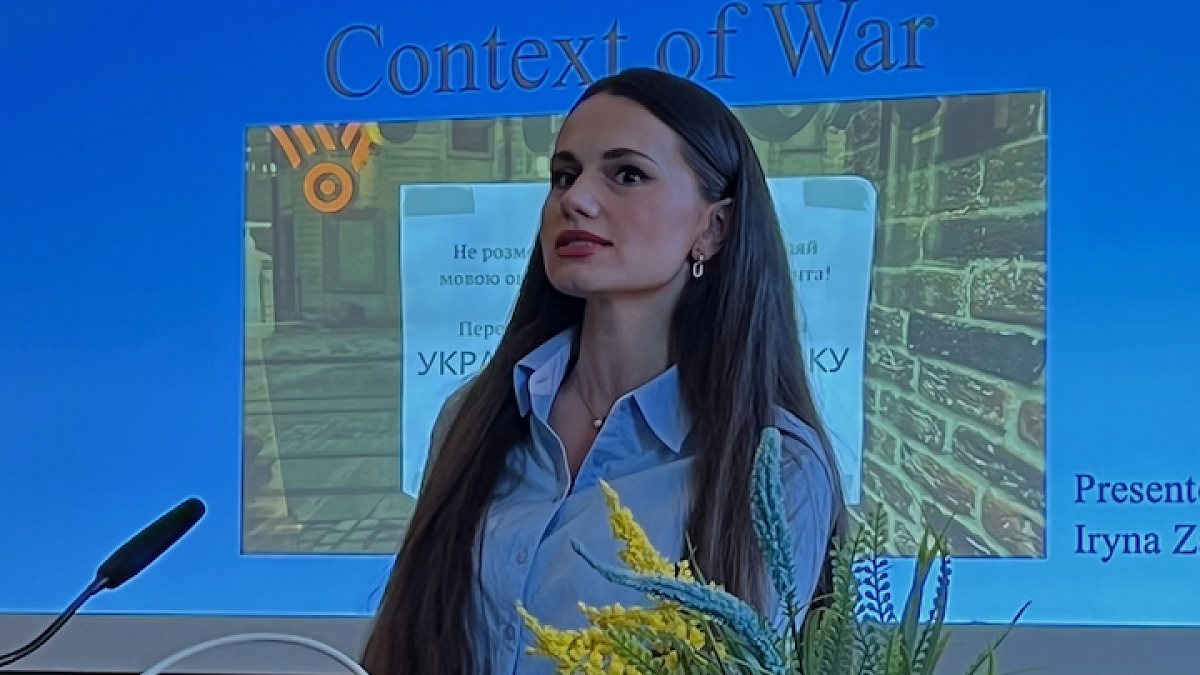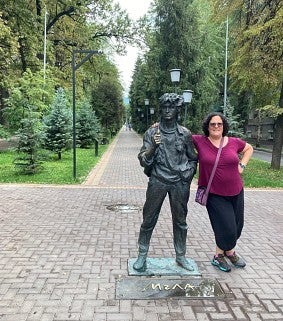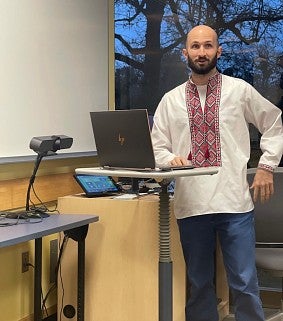
Experiential Learning | Research & Innovation | Community Impact | Career Preparation | Teaching Excellence | 21st Century Liberal Arts | Building Community | Good Vibes | CAS Spotlights | All Stories | Past Issues

Iryna Zagoruyko, who teaches Ukrainian at the Yamada Language Center, speaks about the value and importance of the Ukrainian language during 'One Year On: A Community Forum on Russia’s War on Ukraine.'
Rethinking Russian Studies
The week Russia invaded Ukraine, Julie Hessler was in the midst of teaching a new history course on the non-Russian parts of the Soviet Union—including an entire unit on the history of Ukraine.
“I’d been doing a ton of reading about Ukraine in preparation for this course,” says the University of Oregon associate professor of history. “The students were excited to have a course whose last few weeks focused directly on contemporary Ukrainian history.”
Since then, Hessler has continued to seek opportunities to shine a spotlight on Ukraine, both in and out of the classroom. And she’s not the only one.
As Russia’s war against Ukraine drags on and geopolitical tensions around the globe continue to escalate, faculty across the College of Arts and Sciences (CAS) are taking part in an international effort to decolonize Russian and Slavic studies by changing the way they research and teach about the regions that comprise the former Soviet Union.
The war has prompted university departments and officials around the world to examine everything from which textbooks and sources they use to which archives they delve into. The Association for Slavic, East European, and Eurasian Studies has made "decolonization" the theme of its 2023 conference in Philadelphia this winter. And while the changes have posed a challenge for many scholars in the field, UO professors say they welcome the transformation.
“We are trying to examine the ways in which we’ve been unthinkingly Russo-centric and unthinkingly approaching things from Russia’s perspective,” says Katya Hokanson, professor of Russian and comparative literature and director of CAS’s Russian, East European, and Eurasian Studies (REEES) program. “We’re all looking at how we’ve done things, from the way we represent our departments to the way we’re teaching our classes. It’s definitely a big wakeup call.”

Decentering Russia
Many scholars argue that academia has focused too much on Russia at the expense of colonized areas and groups such as Ukraine, Central Asia and the Caucasus.
Take Nikolai Gogol, for example. Immortalized as an influential Russian author and playwright, he made an undisputed impact on 19th- and 20th-century Russian literature. But many people don’t realize he was born in Ukraine under the name Mykola Hohol and drew heavily from his Ukrainian heritage in his writing.
“He chose to write in Russian because to make an impact in the Russian Empire, you had to be in Saint Petersburg and publishing in Russian at the time,” Hokanson says. “There was a suppression of Ukrainian language, writing and literature—and of course their political aspirations. The Russian Empire did not want Ukraine to have a Ukrainian identity. We talk a lot more about that now in my 19th-century Russian literature class.”
But the movement to de-Russify the REEES program goes beyond updating the curriculum for existing classes. The program is offering a new course on Ukrainian literature, taught by comparative literature PhD and career instructor Anna Kovalchuk, and those who are interested can now learn to speak Ukrainian through the Yamada Language Center.
“Ukraine has a resilient history of linguistic oppression, with Russian attempts to suppress the Ukrainian language spanning decades,” says native Ukrainian Iryna Zagoruyko, who earned a master’s degree in language teaching studies from the UO in 2017 and now teaches the Yamada Center’s self-study Ukrainian language program.
“This adversity has ignited a passionate movement among Ukrainians, compelling them to redouble their efforts in preserving and elevating their native language. I am motivated to be part of this nation-building journey, bearing witness to Ukrainians uniting, transcending their shared hardships and celebrating their indomitable spirit."
Zagoruyko, whose cousin serves in the Ukrainian army, has seen a growing in interest in learning Ukrainian within the UO community. Their reasons for studying the language range from academic curiosity to appreciation of Ukrainian culture, and from a desire to engage in humanitarian work to a drive to foster geopolitical understanding, she says.
In Kovalchuk’s Ukrainian literature class, students recently studied Lesia Ukrainka's 1908 play Cassandra, which has found new popularity in part because it features a woman whose prophesies of war are ignored.
“It speaks to Ukrainians’ feeling of the impending nature of this war and their inability to be heard,” Kovalchuk says. "I think we all want to bring visibility to Ukraine—not just in the context of war, but in the context of a rich literary and national culture and tradition. Part of this idea of decolonization is to be seen on your own terms and not through the prism of someone else.”
The war has also had an impact on study abroad. With trips to Russia off the table, faculty and students alike are pursuing their studies in other Russian-speaking countries. Over the summer, REEES faculty members spent time in Kazakhstan and Kyrgyzstan in Central Asia. And students in study abroad programs are now exploring countries such as Georgia, Armenia and Latvia.
“Now is an important time for Slavic and Eastern European studies in general and Ukrainian studies specifically,” says Walter Bender, a master’s student in history who began learning Ukrainian in reaction to Russia’s invasion of Ukraine. “I’m very happy with the steps the university has taken to provide more classes and options for studying both the language and history of the region, and I hope the university will continue to support these programs.”
Pushing back against imperialism
One thing Hokanson and her colleagues want to emphasize is that studying Russia or its language doesn’t signal an endorsement of the country’s aggression toward Ukraine. Many see it as the opposite: an act of resistance.
“When I first became interested in Russian culture, language and literature, I was thinking maybe we could avoid World War III,” Hokanson says. “I thought if more people learned Russian, we could minimize the potential for bad things to happen. We need to learn it because we need to have a better grasp on what’s happening in the region.”

Hessler, who helped organize an event last spring to show solidarity with Ukraine on the anniversary of Russia’s invasion, was dismayed to learn that some people viewed her as a Russian apologist because of her approach to teaching Soviet history.
“I condemn this war. I condemn Russia’s actions,” Hessler says. “But I also try to strike a balance. I don’t want to condone evil actions, but I do want to provide some context through which students can see where something like this can happen.”
She added that some students—including her daughter, who recently began classes at another university—have been forced to defend to their peers their decision to study Russian.
“(Vladimir) Putin has done a good job of making people dislike and feel suspicious of Russian culture. He is a culture warrior,” Hokanson says. “We have to acknowledge the parts of Russian literature that are imperialistic, but it doesn’t mean we have to cancel the whole of it.”
That’s especially true in a time when Russian studies continues to be important for careers in government and diplomacy, Bender says. He notes that in a connected world, events in Eastern Europe are directly relevant to people in Oregon, which has a large population of heritage speakers.
“If you only study countries that don’t have any issues with their history or politics, that doesn’t leave you with a lot of places to study,” Hessler says. “I still think there’s something to love in Russian literature and culture, despite the oppressive regime.”
—Nicole Krueger, BA ’99 (journalism), is a communications coordinator for the College of Arts and Sciences.
